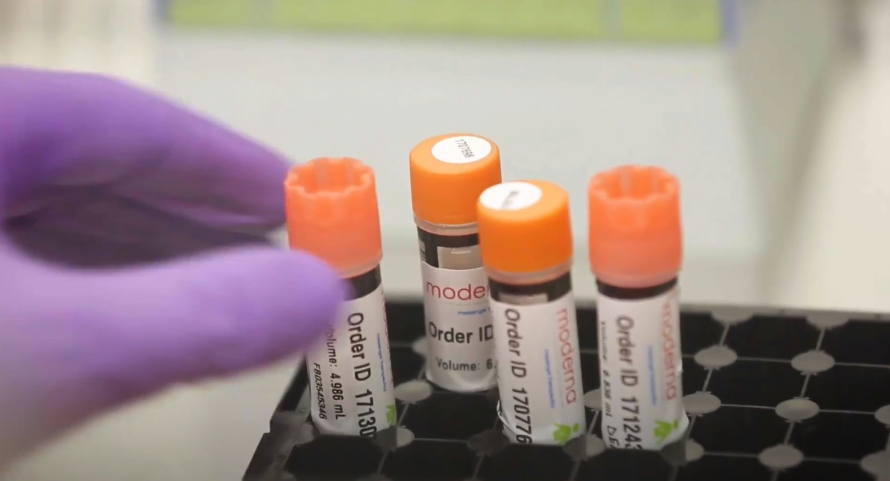The U.S. Patent Trial and Appeal Board (PTAB) has rejected Moderna’s challenge to the last of three patents granted to Arbutus Biopharma covering an earlier version of the delivery technology used in Moderna’s front-running COVID-19 messenger RNA (mRNA) vaccine candidate mRNA-1273.
The PTAB turned back Moderna’s argument that U.S. Patent No. 8,058,069 (‘069) should be overturned because the 22 claims covered by the patent could have been anticipated, and would have been obvious to a person having ordinary skill in the art to which the subject matter pertains.
The patent, “Lipid formulations for nucleic acid delivery,” covers “novel, stable lipid particles comprising one or more active agents or therapeutic agents, methods of making the lipid particles, and methods of delivering and/or administering the lipid particles.”
“Petitioner [Moderna] has not demonstrated by a preponderance of the evidence that claims 1–22 of the ’069 patent would have been anticipated or obvious based on the challenges presented in the Petition,” the PTAB concluded in a decision written by administrative patent judge Christopher G. Paulraj, who heard the case with administrative patent judges Tina E. Hulse and Timothy G. Majors.
Moderna initially responded to the decision with a statement suggesting that it may appeal to the U.S. Court of Appeals for the Federal Circuit. The company noted that the PTAB previously invalidated one Arcturus patent covering liquid nanoparticle (LNP) technology, while delivering a mixed decision upholding half of the 20 claims of the third LNP patent while invalidating the other 10.
“To the extent it is believed the PTAB erred in their decisions, Moderna may further pursue these matters,” the company warned yesterday.
Moderna also asserted that the PTAB decision would not derail its development of mRNA-1273—which the company has said will begin an up-to-30,000 Phase III trial on Monday.
“Moderna has invested in proprietary LNP delivery technology that we expect will allow us to deliver on our mission of creating a new generation of transformative medicines for patients,” the company added.
In a second statement issued today, Moderna said that it had improved upon the LNP technology covered by three Arbutus patents that included the one upheld yesterday by the PTAB: “Moderna’s continued development of its proprietary LNP formulation technology and manufacturing processes have advanced well beyond the technology described in these legacy Arbutus patents. Our improved proprietary LNP formula, used to manufacture mRNA-1273, is not covered by the Arbutus patents.”
Both statements concluded: “Moderna is not aware of any significant intellectual property impediments for any products we intend to commercialize, including mRNA-1273.”
Investors, however, appeared to disagree with Moderna’s interpretation of the PTAB decision as having no effect on mRNA-1273, selling off enough shares to send the company’s share price falling 9.5% or $7.89, to $75.33 at the close of trading yesterday. Shares slid further in early trading today, to $71.75 as of 11 a.m. ET before rebounding to $73.29 as of 2:20 p.m.
Shares of Arbutus, by contrast, more than doubled following the decision, rocketing about 120% to $6.20 a share. The share price climbed another 19% in after hours trading, to $7.37 as of 8 p.m. ET, before falling to $5.60 at 2:20 p.m.
mRNA-1273 is one of 18 “Front Runner” candidates among the more than 275 COVID-19 therapeutics included in GEN’s updated “COVID-19 DRUG & VACCINE CANDIDATE TRACKER.”
The ‘069 patent, granted in November 2011, details the invention of stable nucleic acid-lipid particles (SNALPs) consisting of a nucleic acid (such as one or more interfering RNA), methods of making the SNALP, and methods of delivering and/or administering the SNALP.
The SNALP particles “advantageously impart increased activity of the encapsulated nucleic acid (e.g., an interfering RNA such as siRNA) and improved tolerability of the formulations in vivo, resulting in a significant increase in the therapeutic index as compared to nucleic acid-lipid particle compositions previously described,” according to the patent.
Moderna filed in January 2019 for inter partes review (IPR) of the ‘069 patent—similar to IPR petitions the company filed against Arbutus’ U.S. Patent No. 9,404,127 (‘127), “Non-liposomal systems for nucleic acid delivery,” in February 2018, and against U.S. Patent No. 9,364,435 (‘435), “Lipid formulations for nucleic acid delivery,” the following month.
The ‘127 patent, granted in August 2016, covers SNALP particles that have a non-lamellar structure and that consist of a nucleic acid (such as one or more interfering RNA), methods of making the SNALP, and methods of delivering and/or administering the SNALP. The ‘435 patent, granted in June 2016, covers lipid particles consisting of one or more active agents or therapeutic agents, methods of making the lipid particles, and methods of delivering and/or administering the lipid particles.
The PTAB upheld the ‘127 patent on September 10, 2019. The following day, the PTAB issued its mixed decision on the ‘435 patent.



